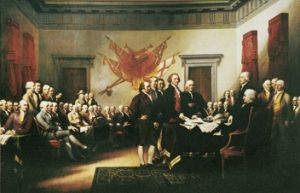Founding Fathers Context

Artist: John Trumbull
Date:1817
The eighteenth century was a time of tremendous change. In only 100 years, the population of the new world expanded from 110 thousand people to 1.6 million people. This colossal wave of immigration brought in a great number of slaves and people of Dutch, German, French, and Jewish decent. These settlers did not face the hardships that the colonists had in the past, allowing a newfound independence from English ways. With a blank slate in a land of diversity, inhabitants had to figure out the pillars in which they wanted to build their new country. The two central pillars included a distinctly American identity and abandoning the idea of a single, united church.
The regimented practices of the Puritan religion died off in the early eighteenth century, paving the way for the Enlightenment period. In the face of new scientific discoveries, intellectuals, such as Benjamin Franklin, Isaac Newton, and John Locke, needed a way to balance their Christian values with their scientific findings. They discredited the Puritan belief that every event in a person’s life is predetermined by an all-powerful God, and argued that each human has control over their spiritual destiny. Deists, in particular, believed in a scientific creation where the universe was formed by a single God, but said God did not interfere with daily happenings. Reason began to outweigh religion as people began to analyze how aspects of human nature conflicted with the teachings found in the Bible. The spread of Enlightenment ideals was contested in the mid-eighteenth century by an onslaught of Puritan revivals termed the Great Awakening. The movement gained traction arguing that Puritan theology could be applied to Enlightenment science in a way that was applicable and made sense. The conflicting religious beliefs present during this time was not seen in any other country. This unique problem helped set the precedent for religious freedom that was to come.
Enlightenment writers such as J. Hector St. John de Crevecoeur and Benjamin Franklin were charged with creating a foundation for American identity that would deliberately separate America from Europe. The themes of hard work, diversity, and self-improvement are common throughout both de Crevecoeur and Franklin’s writings and can even be viewed even in twenty-first century American society. Yet women, Native Americans, Jews, and slaves were not typically acknowledged in early American literary works. Throughout the eighteenth century it was not uncommon for white Christians of varying European decent to marry one another, but rarely were the lines of religion and race crossed. The Native American population continued to dwindle as expansion continued and more than half of the actual population of the United States were slaves. Similarly, women of all races were not given basic human rights. The exclusion of these integral social groups in the writings of de Crevecoeur and Franklin would become increasingly significant in the centuries to come.
Gura, Philip. “American Literature 1700-1820.” The Norton Anthology of American Literature:Beginnings to 1820, edited by Nina Baym and Robert Levine, W.W. Norton & Company, pp. 365-376.